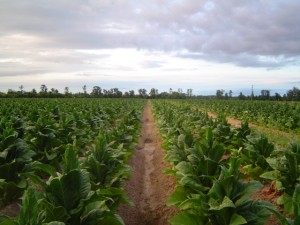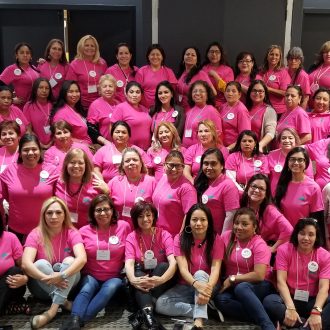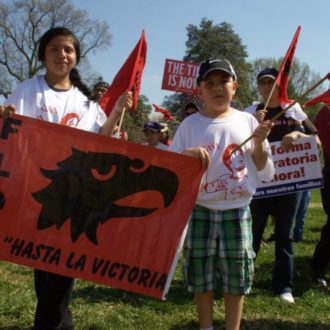Ryan Nilsen, NFWM Intern
Note: This sermon references Isaiah 5:1-7 and John 15:1-8.

Let me sing for my Beloved my love-song concerning his vineyard
“Let me sing for my Beloved my love-song concerning his vineyard.” Now, I’m not a very good singer, and I am not going to call myself an expert on love-songs, but did you all just hear what the prophet Isaiah is calling a love song in these verses? He tells a story about his friend, the Beloved, doing everything that he can to grow grapes in this vineyard. But the grapes that he grows end up being wild grapes that taste bad instead of good ones, and so he decides to destroy it.
In this “love song” Isaiah details the destruction of all the things that his friend had originally set up to care for the vineyard. He says, “I will remove its hedge, and it shall be devoured; I will break down its wall, and it shall be trampled down. I will make it a waste; it shall not be pruned or hoed, and it shall be overgrown with briers and thorns.”
Is this really a love song? It sounds more like a song of violent destruction. It’s disturbing! And then it gets worse as Isaiah explains the vineyard is a metaphor. God is the owner of the vineyard, and the vineyard is supposed to represent the people of the House of Israel that Isaiah is speaking out to. The people failed to produce what God expected of them. This dramatic song ends with Isaiah crying out, “He expected justice, but saw bloodshed; righteousness, but heard a cry!” Whew. This is intense stuff. The kind of theology that makes people uncomfortable. It’s the classic angry prophet material, with Isaiah calling out the peoples’ injustices in the name of God.
You see, this was a period in Israel’s history where some people were becoming really rich, mostly because of the development of international trade routes. Before this time, everybody in Israel had an allotment of land that God had given them and their families when they had first come to the Promised Land. But people realized that they could become rich by putting pressure on all the people who owned small farms to buy up their land, and create big vineyards… which they could use to produce wine… which could make them a lot of money.
Selling one’s land is a tempting deal, especially for people who were landowners but still poor, and a lot of people sold the land that God had given them. Maybe things got so bad that they felt like they had to sell it in order to get by, or maybe it just seemed like a good idea at the time, a way to make a lot of money fast. But when the money they had from selling their land ran out, these landless folks ended up working for the rich people who bought up all the land to create these vineyards.
So there became this huge underclass of people who didn’t own land anymore, who worked at the bottom of society, and the system was basically built such that they couldn’t ever rise up out of their poverty. The ability for the vineyards to make profits depended on their poverty. These people had to stay poor in order for the system to continue the way it was.
Isaiah’s choice of metaphor, even the word “vineyard” in this time period was really charged. It would have been like mentioning something really controversial like raising or cutting taxes, Wall Street, government bail outs, or maybe the North Carolinastate budget today. Vineyards had come to symbolize power, extreme abundance and prosperity for the privileged classes and injustice and oppression for the poor, the people who worked in these vineyards.
Now, I’m not sure what his tone would have been like with this “love song” – maybe sort of ironic or perhaps sarcastic and biting – but it is clear that there’s this element of surprise or the unexpected, that Isaiah is trying to draw attention to an unseen injustice. He likely sung these words out in front of the temple, during a harvest festival, where people would have been gathered around to celebrate, to worship and sing praises to God for the prosperity that they had achieved.
But you know the poor, landless farm workers probably weren’t there celebrating all of this abundance with them. Let me ask you this. Do poor people and rich people usually go to church together? Do the poor celebrate prosperity that they don’t ever see themselves? Not everybody gets Sundays off.
So we can imagine that many of the people at the festival weren’t thinking about and didn’t want to think about the people whose suffering made possible their own success. But you see Isaiah wouldn’t have that. Isaiah knew that God loves everyone, that God doesn’t stand for injustice, that God expected more of them, these religious people, and would not let poor workers go unseen as the people worshiped in God’s name. I don’t think Isaiah is being sarcastic after all. I think this is a love song. Out of love for the poor, Isaiah wants to call the people to live out God’s justice, and he does this by drawing attention to farm workers
I am working this summer with the National Farm Worker Ministry. That’s what brought me back to Greensboro after my first year of divinity school. And I have been learning a lot about and having the chance to begin to know farm workers – especially farm workers in North Carolina– these past few weeks, and I can’t help but think that there might be some really strong parallels between the situation that Isaiah’s talking about in ancient Israel and our own food system today.
First of all, our world has about the strongest international trade routes that have ever existed in the history of humanity, and some people are richer than anyone has ever been in the history of humanity. Have you heard of globalization?
And farming is big here in North Carolina. We used to have a lot of small farms, families that owned land and maybe raised chickens or cows along with growing vegetables that they would sell to their neighbors, but all that has gotten less and less common. Now we have huge factory farms that all grow one thing like tobacco and ship it all over the world. Most people have no idea where most of their food is coming from, and even if you want to know and try to, I’m not sure if you could ever figure it out.
But I’ve been learning lately mostly about the people working on our farms. It’s hard to document, but we have probably about 150,000 thousand people who work on farms in North Carolina each year. Of that 150,000, 94% are native Spanish speakers, mostly from Mexico or Central America. Most of them are men whose families are back in the country that they come from. At least half of these men are undocumented, and that estimate is considered pretty low. Some say it’s probably more like 80 or 90%. Farm workers in North Carolina probably make on average about $7,500 a year, and that makes it about the lowest paying work around. Their jobs are often exempt from legal protections that other workers have. Farm workers suffer from the highest rate of toxic chemical injuries and skin disorders of any workers in the country. It’s about the only type of work where you could see twelve year old kids doing hard manual labor – legally – and working 10 hour shifts. There’s not much question in my mind that our system is not valuing farm workers as people in nearly the way we like to think that we value people in our country.
But the parallels between the farm workers in ancient Israel and those here today aren’t just in that they work hard at dangerous jobs and don’t get paid well. A lot of farm workers are corn farmers who owned and farmed their land in Southern Mexico but lost their land after the North American Free Trade Agreement (NAFTA) passed. This effectively made these small farmers compete against massive US corn producers financially supported by US government subsidies. So these people went out of business, lost their land, didn’t have jobs, and then they heard that they could come work on farms in places like Guilford County.
So here they are, working hard to harvest the food that we eat everyday, and most of us just don’t think much about them. It’s really not that different from what I read was happening in Isaiah’s day. Oh, except that today many of our workers can’t come here legally – because we don’t allow that – so they have to make these often dangerous trips on trains and through the desert in order to even get here and hopefully find a job.
Our food system, the food that we eat every day, depends on people from other countries being poor enough to want to come here and work hard, dangerous jobs in our fields. Unless we live in rural areas or really go out of our way to meet people doing farm work, we don’t know anything about them. All we hear about is illegal immigration and people trying to steal our jobs and cause problems in our society. These are the people that make it possible for us to eat! I am afraid that today, just as in Isaiah’s time, our treatment of farm workers represents all too well the exact place where we can see how we are not living up to God’s expectations of us.
So the question for me quickly becomes then – well, is there an answer? Unfortunately, Isaiah doesn’t offer one. He just calls out the injustice. It looks like the vineyard will be destroyed, the people will be punished, the land will never produce grapes again. It’s really kind of depressing, and I find it really easy to get depressed when thinking about farm workers in our state – or injustice and oppression in our world more generally. We all know it’s not just farm workers. All sorts of classes of people are oppressed by the way that our society and particularly our economic system works out.
But we can’t stop with the depression. Isaiah chose to use the image of a dead vineyard to draw attention to injustice and the brokenness of our systems a long time ago, but the vineyard really is still an important part of our own faith community and what we do when we come together every week. First off, in that reading from John chapter 15, Jesus says “I am the true vine, and my Father is the vine grower,” right? This wasn’t a careless choice of metaphor either. Jesus knew what Isaiah and the prophets talked about as well as anyone, and he was declaring, in himself, that the vineyard would no longer remain a wasteland. Isaiah’s “Song of the Vineyard,” which ends with God destroying the vineyard in God’s anger, is not the end of the story, amen? The vineyard would be redeemed. It would be – should we say – resurrected!
And we practice this metaphor every week. When we take communion every Sunday, the minister introduces the Lord’s Supper and reminds us that Jesus took the wine – made from grapes that grew in a vineyard and were harvested by farm workers – and says, “This is my blood, shed for you. Drink of it remembering me.”
In this practice of communion, Jesus is telling us to remember the brokenness – the pain, the oppression in our world, the farm workers and everyone else who suffers and is neglected by our society – and to come together, remembering Jesus, and to drink and eat together, in hope. When we drink the cup of communion, we are remembering this story of the redemption of the vineyard. We are testifying that we believe that even the most broken, dead vineyards and farms and every other place in our world can be transformed.
And, as we take this redeemed wine or grape juice into ourselves, we are saying that we want to becomes part of the solution. We are saying, “Here I am, Lord! Send me! Use me as an agent of change! Use me to continue to redeem the vineyard, to help bring justice to farm workers, to fix our immigration system, to love our neighbors, to care for the poor. Use me to change our world!”
Even as we remember Christ’s broken body and shed blood, our communion should be, in the words of Isaiah, a love song. These passages provide us with a clear, Scriptural challenge to care and be involved. This means that we need to get to know farm workers in our communities, to be in relationship with these people behind the products that we consume and keep us alive, and it also means that we need to support them as they organize to change the system. We may have ideas about what needs to change, and we should, but we need to look to farm workers themselves to figure out how best to go about doing that. Who better knows what needs to happen than the people affected most by the failures of our system? I will look forward to continuing this conversation with you all and moving forward in the process of learning how to better live out the faith that we profess with respect to justice for farm workers.
For further information on the agricultural and political context of Isaiah 5:1-7, see:
- Marvin L. Chaney, “Whose Sour Grapes? The Addressees of Isaiah 5:1-7 in the Light of Political Economy,” Semeia, 87 (1999);
- Victor H. Matthews, “Treading the Winepress: Actual and Metaphorical Viticulture in the Ancient Near East,” Semeia, 86 (1999);
- Victor H. Matthews, The Social World of the Hebrew Prophets (Peabody: Hendrickson, 2001).
A version of this sermon was delivered by NFWM intern Ryan Nilsen to New Creation Community Presbyterian Church in Greensboro, NC on July 3, 2011. Ryan is currently pursuing a Masters of Theological Studies at Duke Divinity School.


